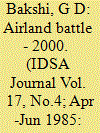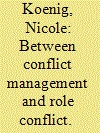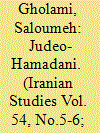| Srl | Item |
| 1 |
ID:
185326


|
|
|
| 2 |
ID:
131627


|
|
|
|
|
| Publication |
2014.
|
| Summary/Abstract |
This paper assesses the role of the European Union in the Libyan crisis (2011) and critically considers the implications for its evolution as an international security actor. Employing role theory, the paper reviews the historical development of the Union's security actorness and sheds specific light on the balance between self-conception and external expectations in the case of the Libyan crisis. Its central argument is that, despite external expectations and European narratives of a 'comprehensive power role', the Libyan crisis showed that the Union still acts in line with its traditional role as a civilian power. The inability to go beyond civilian power stemmed from internal dissonance on a potential hard power role and a corresponding lack of material capabilities. The growing gap between expectations about comprehensive actorness on the one hand and performance on the other is likely to damage the Union's future credibility as an international security actor.
|
|
|
|
|
|
|
|
|
|
|
|
|
|
|
|
| 3 |
ID:
186252


|
|
|
|
|
| Summary/Abstract |
Tajikistan declared its independence on 9th September 1991, soon after the breakup of the former Soviet Union.At that time, it was not only the smallest republic of the region but also it had the lowest population compared to other post-Soviet Central Asian states. Tajikistan is the only Persian speaking country in the region. Being surrounded by the Turkic speaking population, there was a sense of fear that it would be overwhelmed by the Turks in the region. Also, immediately after gaining independence, Tajikistan was plunged in a brutal civil war that lasted until 1997.
|
|
|
|
|
|
|
|
|
|
|
|
|
|
|
|
| 4 |
ID:
180017


|
|
|
|
|
| Summary/Abstract |
The study of the language of religious minorities in Iran is particularly important for understanding the historical development and typology of Iranian languages. Historical and linguistic evidence substantiates the idea that Zoroastrians and Jews in cities in central and western Iran preserved their former vernacular language, whereas the majority of the population replaced it with Persian in the New Iranian period. This paper focuses on the language of Jews in Hamadan and has two main objectives: first, it examines numerous distinctive features of Judeo-Hamadani; second, it reviews and updates recent research to clarify the language origins, using data from new materials recorded during fieldwork in Hamadan from October 2018 to August 2019, and in Yazd in 2017.
|
|
|
|
|
|
|
|
|
|
|
|
|
|
|
|
| 5 |
ID:
101826


|
|
|
|
|
| Publication |
2011.
|
| Summary/Abstract |
This article, the result of qualitative research conducted in Ankara, aims to depict the republican understanding of citizenship from the behaviour patterns and daily practices of citizens and to show how it diverges from various other forms of citizenship understanding. Republican citizenship - the most dominant and hegemonic understanding of citizenship in Turkey - was constituted in the process of foundation of the Turkish Republic as a nation-state. In Turkey's historical experience, this tradition, which is based on civil responsibilities, could not develop sufficiently in terms of individual rights and democratic values. As reflected in the perceptions and practices of citizens, Turkish society is still not very close to a democratic understanding of citizenship that strongly defends human rights, legitimacy of differences, equality between people as well as embodying responsibilities for the society.
|
|
|
|
|
|
|
|
|
|
|
|
|
|
|
|
| 6 |
ID:
129143


|
|
|